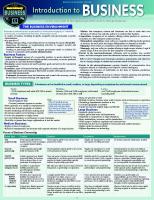Introduction to Business A QuickStudy Digital Reference and Study Guide
353 45 964KB
English Pages [6] Year 2022
Recommend Papers

- Author / Uploaded
- Kyle Allison
File loading please wait...
Citation preview
WORLD’S #1 ACADEMIC OUTLINE
Expand your reach to the right people and market to increase business
THE BUSINESS ENVIRONMENT -Market: free enterprise; citizens and businesses are free to make their own decisions of what to buy and sell, and how to conduct their business • Competition: companies of an industry offering similar products or services to consumers in a free enterprise market economy -Monopolistic competition: many sellers or competitors offering similar products or services, but each seller has unique differentiators on features or benefits -Oligopoly: fewer sellers or competitors with less choice differentiation -Monopoly: only one seller in a market offering a single-source solution. Legal if patent; illegal if does not allow for free enterprise of competition • Factors in the macroenvironment: influences such as politics, law, societal issues, and other emergent issues that determine business objectives and outcomes
Business is defined as any organization or enterprise engaging in industrial, commercial, or professional activities. A business can be:
• A variety of models, including for-profit, nonprofit, and governmental or public administration • Any practice of: -Making, buying, selling, or providing services in exchange for money (for-profit) -Supporting, developing, or implementing activities to support societal and charitable needs (nonprofit) -Creating or practicing activities to support government needs or solutions for society or community needs (public administration)
Business Factors
• Supply & Demand: amount of a commodity, product, or service desired by the customer base (demand) and the tangible product, commodity, or service produced and quantity to meet that demand (supply) • Economics: scarce resources are used to produce goods and services for commercial or nonprofit use • Economies: types of business dealings taking place in certain markets -Traditional: found in developing or third world countries where goods and services are provided generationally -Command: government owns the businesses and controls the economy, making the decisions on business dealings and opportunity
BUSINESS TYPES
EX: Covid-19 changed many businesses operations, opportunities, and objectives due to varying changes in market and consumer trends or behaviors. • Factors in the microenvironment: opening channels of communication from employees directly to leadership could improve cultural intelligence -Influences the decisions of individuals on the basis of business production, exchange, or consumption • Technology: continually advancing to enhance business planning and operations and keep pace with developing new consumer or market needs
A business can be classified as small, medium, or large, depending on employee size and annual revenue earned
Small:

![Philosophy: A Quickstudy Laminated Reference Guide (Quickstudy Reference Guide) [2 ed.]
1423239938, 9781423239932](https://ebin.pub/img/200x200/philosophy-a-quickstudy-laminated-reference-guide-quickstudy-reference-guide-2nbsped-1423239938-9781423239932.jpg)
![Quickbooks: a QuickStudy Laminated Reference Guide (Quickstudy Reference Guide) [2 ed.]
1423241894, 9781423241898](https://ebin.pub/img/200x200/quickbooks-a-quickstudy-laminated-reference-guide-quickstudy-reference-guide-2nbsped-1423241894-9781423241898.jpg)
![Business Research: A QuickStudy Laminated Reference Guide [2 ed.]
9781423238867, 1423238869](https://ebin.pub/img/200x200/business-research-a-quickstudy-laminated-reference-guide-2nbsped-9781423238867-1423238869.jpg)



![Earth Science: a QuickStudy Laminated Reference Guide [2 ed.]](https://ebin.pub/img/200x200/earth-science-a-quickstudy-laminated-reference-guide-2nbsped.jpg)

